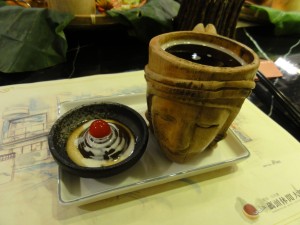When I wrote my application to come to Taiwan, I said that I was coming to study tea. My proposal was primarily to conduct scientific study of environmental impacts of tea farming. However, the logistics of conducting a meaningful study of anything related to environmental science appear to be quickly withering away my time in Taiwan – a mere 10 month period. A project to do fieldwork in a place that you’ve never been before simply requires lots of logistics. Questions of what is where and where to go, followed by unfamiliar regulations, such as where you are allowed to do things and when… Some of these can be navigated by simply having a local walk you through the basics, or arrange things for you. But that, too, presents more complications: building the social network to do the work there. Who are the right people to talk to and are there people whom you should avoid? Who works on similar things and might have insight? I’ve been gradually stepping through all of these things as I’ve been here and learning from the process.

I’m now going to look at sites to sample for doing a comparative study of nutrient cycling in organic and non-organic tea farms. Finding farms that are comparable is an important and difficult step. Many things will affect the soil qualities in a region (here’s where I could insert the introduction of my undergraduate thesis) so it is important to try to minimize these other factors so that I can focus on how the alternate farming practices may be responsible for differences. Once good sites have been found, I will take samples and analyze them, (there is still ongoing discussion about which samples exactly we will take because this will depend somewhat on the final locations that we choose).
But that wasn’t the only part of tea research that I intended to conduct while in Taiwan. I first became interested in tea because of how much I enjoyed drinking it. Yet, enjoying tea is not all about how delicious, complex, elegant and clarifying it can be to drink it (I ranted about this in more detail in an earlier entry…) It is also a large part about being able to share the appreciation with others – an appreciation that has hundreds of years of history. Tea is steeped in culture and tradition, literally and figuratively. The plants that are grown today are cultivars that have been meticulously cultivated for generations for specific tastes. The methods of making and brewing tea have also been carefully honed, practiced and passed on.

Understanding the modern presentation of tea in Taiwan was also one of my goals in coming here. So far, I haven’t adopted any particular methods for this. Instead, I’ve simply been keeping my eyes and ears open, asking questions, talking to as many people as possible, taking pictures and learning what I can.
To begin with, the forms of tea are varied. This is, itself a phenomenon worth mentioning. I’ve experienced tea in all sorts of forms:
- street bubble tea
- tea oil used to flavor cooking
- careful “microbrews” of high-quality teas
- fried tea leaves
- tea bottled drinks of all kinds
- tea donuts & cakes
- … etc…
Tea is clearly a part of a common person’s culinary existence in this part of the world. While it is possible that some people avoid it altogether, such people would likely have to be actively working to maintain this state.

Why bring this up? Obviously there is a lot of tea drinking – tea is supposedly the most-widely consumed liquid in the world excluding water (though I am somewhat skeptical as to how such a statistic is obtained). Yet, I have found myself wondering about a disappearance of tea from Taiwanese and Chinese culture. I should look for more resources to help me understand this, but I am confident that this is occurring.

Considering that Taiwan is generally even more Westernized than China, I was not sure how large of a hold tea would still have in the daily lives of people here. And sometimes when I observe my Taiwanese friends, it is apparent that tea really isn’t any more important to them than it is to many of my American friends who don’t drink any tea.
However, the multitudinous forms of tea keep it omnipresent. There hasn’t been a disappearance of tea here at all; instead there has been an expansion of the realms that it can occupy. It’s not exactly the same as it used to be, but despite whatever changing identities and economic pressures it may be facing, tea has not been edged out of Taiwanese society. The traditional forms also continue along quietly alongside the new interpretations that strive keep up with the interests of modern consumers. Tea is alive and well in Taiwan.

Spending time in another heavily tea-steeped culture, its really interesting how the importance of tea still manages to be so dramatically different. It sounds like Taiwan is much more interested in the tea itself whereas Russia tends to only really focus on the communal properties of tea drinking.